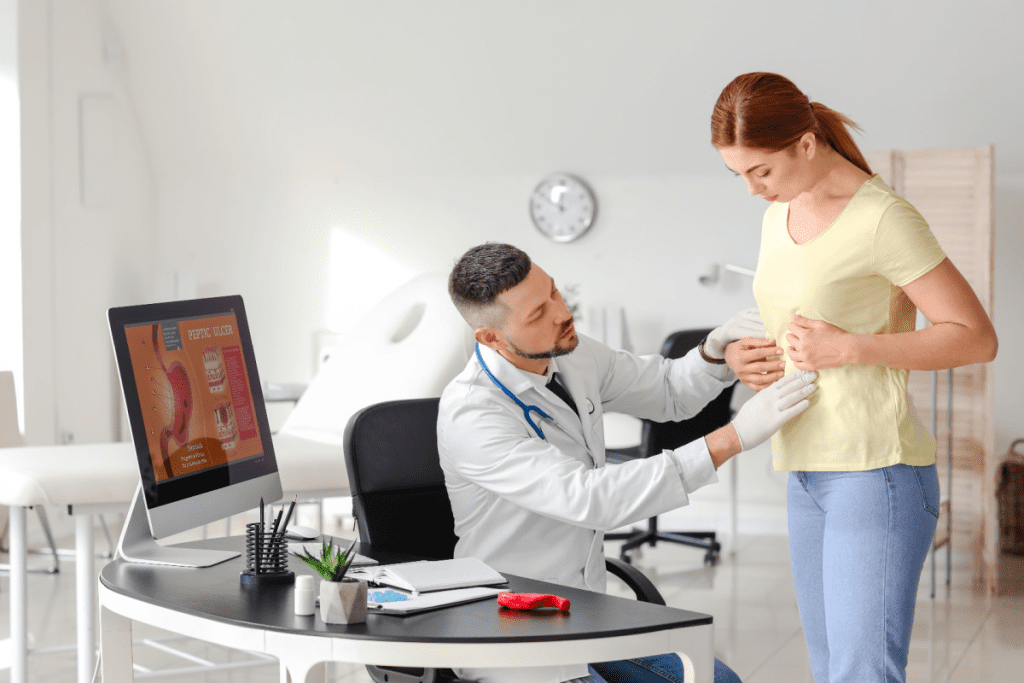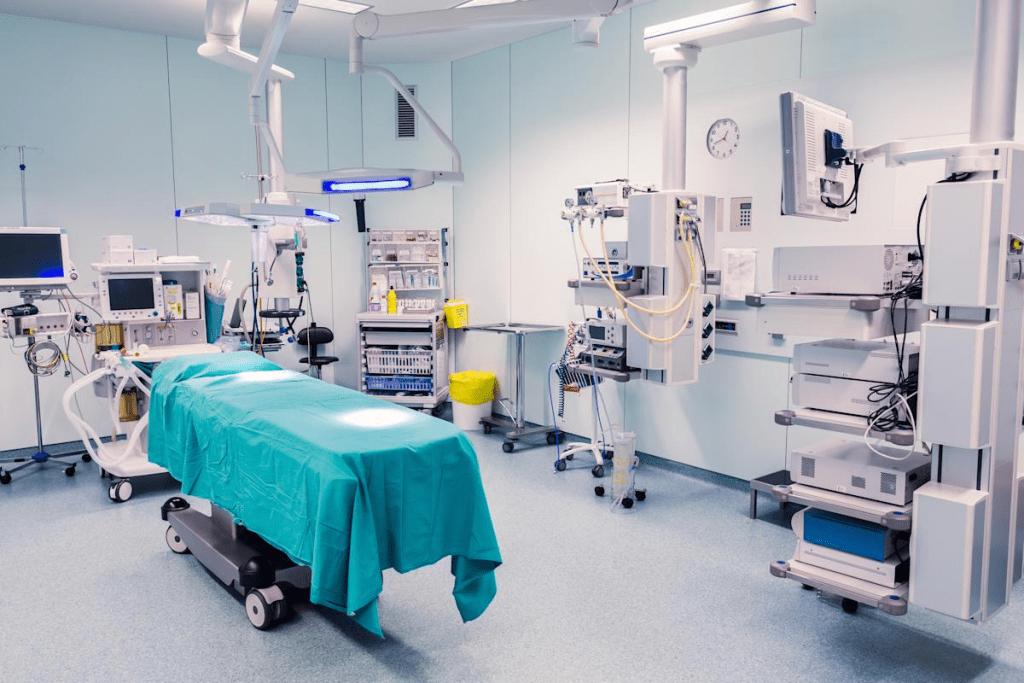Last Updated on November 14, 2025 by

Seeing a gastrologist for the first time is a big step for your digestive health. At our place, we know how key this first meeting is. At your first visit, you’ll get a full check-up. This includes looking at your health history and doing a physical exam. Our gastroenterologists aim to give you world-class healthcare. They also offer support and help for international patients. The visit usually takes 30 to 60 minutes in a private room. Your gastrologist will ask you lots of questions to understand your health, lifestyle, and what’s bothering you. This detailed evaluation helps the doctor develop a personalized treatment plan that fits your needs.

To get the most out of your first gastroenterology visit, being well-prepared is key. You’ll need the right documents and information. Our team works hard to make this process easy for you.
It’s important to bring the right medical records. This includes notes from your doctor, lab work, and test results. Also, don’t forget a list of your current medications and any important medical history.
Knowing your diet and medication is important for treating stomach issues. Be ready to talk about your eating habits, food allergies, and how you’re handling symptoms.
Write down your questions and concerns before the visit. This way, you can make sure to discuss everything with your doctor. You might want to ask about your diagnosis, treatment options, and what to expect during and after the visit.

Gastroenterologists are doctors who focus on the stomach and intestines. At LivHospital, our team has a lot of training. They can handle many GI problems.
A gastrologist is key for good digestion. We deal with many GI issues. We find the cause of your symptoms and create a plan to fix it.
Common Conditions Treated
Gastroenterologists treat many conditions, including:
If you have symptoms, seeing a gastrologist early can help manage these conditions effectively.
Specialized Training and Expertise
Our gastroenterologists and gastrologists are well-trained for complex GI issues. They keep up with new research. This ensures our patients get top-notch care.
The Initial Consultation Process
At LivHospital, we make your first visit to a gastroenterologist or gastrologist easy and informative. We want to understand your health fully and create a treatment plan just for you. We know seeing a gastrologist for the first time can be scary. So, we aim to make it as comfortable and helpful as possible.
Comprehensive Health History Evaluation
At your first visit, our gastroenterologists and gastrologists will ask you lots of questions. They want to know about your symptoms, health history, and lifestyle. Our team listens carefully to your concerns and gathers all the information needed for your diagnosis and treatment.
Physical Examination Procedures
After talking about your health, we’ll do a physical exam. This might include checking your belly, feeling for tenderness, and possibly a rectal exam. Our gastroenterologists and gastrologists are very skilled and professional in these exams.
Initial Doctor-Patient Conversation
Talking with your doctor or gastrologist is a key part of your visit. It’s a chance for our specialists to hear your concerns, answer your questions, and explain what’s next. We want you to share all your symptoms and worries.
Some important things to talk about include:
By the end of your first visit, you’ll know more about your health and what we plan to do. Our goal is to give you caring and effective treatment options with the guidance of your gastrologist.
Diagnostic Tests and Procedures
To find and treat stomach problems, your doctor or gastrologist might suggest different tests. At LivHospital, we use many tests to get the info we need. This helps us make a good plan for your treatment.
Initial Laboratory Tests
We begin with lab tests, like blood and stool samples. These tests show us your health and if there are stomach issues.
Common Imaging Studies
Imaging tests give us a look at your stomach. Common ones include:
Specialized Gastroenterological Assessments
For a closer look, we might suggest special tests like:
Your gastrologist will explain these tests and what to expect.
Understanding Wait Times for Procedures
Wait times can change based on how urgent and complex the test is. Some patients might wait weeks. We aim to see you as soon as we can and work hard to make it happen.
At LivHospital, we’re all about top-notch healthcare and helping international patients. We’re here to make sure you get the best care for your stomach needs with your trusted gastrologist.
What Happens After Your First Visit
After your first visit to a stomach doctor, also known as a gastroenterologist or gastrologist, a treatment plan will be made just for you. At LivHospital, we make sure you know all about your treatment. This includes any follow-up appointments or referrals you might need.
Understanding Your Treatment Plan
Your gastroenterologist or gastrologist will create a treatment plan just for your condition. This plan might include medicine, lifestyle changes, or more tests. It’s important to understand your plan and ask any questions you have.
Follow-up Appointments and Referrals
You might need to see your gastroenterologist or gastrologist or other specialists again. We’ll help you through this process and make sure you get the care you need.
Managing Symptoms While Waiting
While waiting for more tests or results, it’s key to manage your symptoms well. We’ll give you advice on diet, medicine, and other ways to ease discomfort.
When to Seek Emergency Care
About 14% of patients need emergency care while waiting for procedures. If you have severe symptoms like intense stomach pain, vomiting blood, or trouble breathing, get help right away.
At LivHospital, we’re here to support you every step of the way. Our team, including your dedicated gastrologist, is committed to giving you the best care and guidance.
Key Takeaways:
Conclusion:
Seeing a gastroenterologist or gastrologist for the first time is a big step for your health. At LivHospital, we aim to give you top-notch care with kindness and skill. Our team works hard to make sure you get the best care and support every step of the way.
A gastrologist is key in finding and treating digestive problems. Knowing what to expect at your first visit can make you feel more comfortable. We focus on giving you all the care and support you need, tailored to your specific situation.
Choosing LivHospital means you’re in the hands of skilled gastroenterologists and gastrologists.illed gastroenterologists. We’re here to help you get your digestive health back on track and improve your overall well-being.
Gastroenterology is the study of the digestive system. It includes diagnosing and treating its disorders.
A gastroenterologist deals with the digestive system. They treat issues in the esophagus, stomach, small intestine, and colon.
A gastroenterologist is a doctor. They specialize in the digestive system’s health.
You might see a gastroenterologist for digestive issues. This includes pain, swallowing problems, or bowel changes.
Bring your medical records and current medications. Also, any relevant information about your health.
Your doctor will review your health history and perform a physical exam. They’ll discuss your symptoms and treatment options.
Tests may include lab work, imaging, and specialized assessments. These help diagnose and manage your condition.
Your doctor will explain your treatment. They’ll discuss follow-up appointments and how to manage your symptoms.
A GI doctor is a specialist in the digestive system. They diagnose and treat gastrointestinal disorders.
“Gastro” refers to the digestive tract. It includes the esophagus, stomach, small intestine, and colon.
A gastrologist is another name for a gastroenterologist. They specialize in gastrointestinal disorders.
Gastroenterologists treat many conditions. This includes GERD, IBD, and IBS.
A doctor is called a gastroenterologist. They focus on stomach and digestive tract disorders.
A stomach specialist is a gastroenterologist. They have the training to diagnose and treat stomach issues.
Subscribe to our e-newsletter to stay informed about the latest innovations in the world of health and exclusive offers!